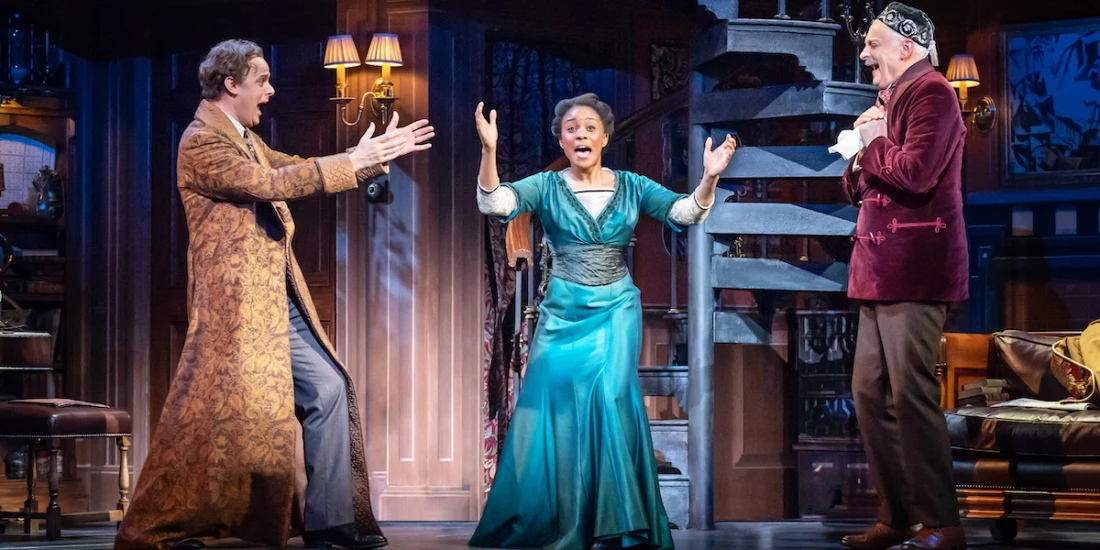'My Fair Lady' review — a loverly revival that balances old-fashioned charm with fresh ideas
My Fair Lady has come home. Bartlett Sher’s celebrated New York production is now playing in the city where its action unfolds, two decades on from Trevor Nunn’s Martine McCutcheon-starring revival. But is this classic musical still an enchanting treat, or does its gender politics preclude our enjoyment of Lerner and Loewe’s incandescent score?
The London run of Sher’s production feels more progressive immediately thanks to its casting. It shouldn’t be this revolutionary in 2022 to have a black actress playing Eliza, yet Amara Okereke is the notable first (just as she was the first black Cosette in the West End Les Misérables).
Add in Stephen K Amos playing her father, and race becomes a silent second dividing line, along with class, between the Doolittles and Professor Higgins, the linguistics expert who bets his friend Colonel Pickering that he can pass off Eliza as a duchess after just six months of lessons. It adds a whole new dimension to Higgins’ efforts to, in his view, civilise her.
But Okereke’s ambitious Eliza can hold her own. She’s fiercely combative from the start, physically squaring up to Higgins and deploying her Cockney squawks like missiles. (Higgins, in response, covers his delicate ears.) She’s a survivor and a shrewd grafter, only rarely letting her guard down – like chuckling with her pals during the wistful “Wouldn’t It Be Loverly?”.
Okereke could give us more light-hearted moments too. She’s certainly adept at comedy, as she demonstrates in the peerless Ascot scene, matching the swooping vowels of each aristocrat she meets as she parrots “How do you do?”. But she does draw back the curtain on Eliza’s rich inner life through her simply gorgeous renditions of the songs, her crystalline soprano soaring into the heavens during “I Could Have Danced All Night”.
Harry Hadden-Paton, reprising the role from Broadway, is a riveting whirlwind of a Higgins. At 41, he’s much closer in age to Eliza, and, unlike Rex Harrison’s stately version, is always on the move, reflecting his busy mind. He leaps up and down the spiral staircase in his library, hurls himself on the sofa when despairing of the opposite sex, and, in a great bit of physical comedy, signals his furious reactions through the window when Eliza and his mother criticise him.
This white lab coat-clad Higgins isn’t just wantonly cruel, but has a scientist’s ruthless focus – plus privilege blindness and a genuine inability to understand other people’s feelings. It puts him on more of an equal footing with Eliza, who shapes him as much as he does her, and Hadden-Paton gives us a fascinating arc from Higgins’ self-satisfied insouciance and arrested emotional development to sheer panic as he loses control in an unusually charged “I’ve Grown Accustomed to Her Face”.
The supporting cast is more of a mixed bag. Malcolm Sinclair is superb as the bluff colonel with a hint of a colourful past (how does this bachelor know where to buy a lady’s gown?), as is Maureen Beattie as the put-upon housekeeper Mrs Pearce. Her growing exasperation with her eccentric employer is a dynamite running gag. Sharif Afifi is a sweetly Tiggerish Freddy, but overdoes the blithe enthusiasm. “On the Street Where You Live” doesn’t need that many injections.
Most glaringly, Amos is miscast as Doolittle. He’s not up to the singing and he mumbles the dialogue, throwing away some brilliantly crafted lines. A shame, because George Bernard Shaw’s commentary on a smug middle-class dictating how the “undeserving poor” should live is powerfully pertinent – just as, depressingly, Higgins’ observations on verbal class distinctions still apply. Vanessa Redgrave is luxury casting and a staunch ally for Eliza, but, leaning on a crutch and her voice wavering in places, she’s a little lost on the cavernous Coliseum stage.
That applies generally: everything could be projected more, especially for a show in which language itself is so lauded. The cast often compete with the magnificent ENO Orchestra, meaning details are lost. Michael Yeargan’s design, with its Turner-esque skyline backdrops, storybook flats, evocative lampposts and a revolve that sweeps us around the Higgins abode, is handsome but slightly stranded. However, Catherine Zuber’s sumptuous costumes are literal showstoppers, from the satellite dish-sized hats to Eliza’s shimmering ballgown.
Sher’s ambiguous – and controversial – choice of ending won’t be to everyone’s taste. For me, it’s not quite earned, despite some feminist touches elsewhere, like the inclusion of protesting suffragettes. But this is a thoughtful grappling with a rich and complex musical, balancing old-fashioned charm with fresh ideas, and, at its best, blossoming into a truly loverly night out.
My Fair Lady at the London Coliseum to 27 August. Book My Fair Lady tickets on London Theatre.
Photo credit: Harry Hadden-Paton, Amara Okereke and Malcolm Sinclair in My Fair Lady at the London Coliseum (Photo by Marc Brenner)
Originally published on
